Al Jazeera mourns assassinated journalists with moment of silence
Al Jazeera employees held a moment of silence to honour its five staff members assassinated in an Israeli strike in Gaza
Source link
Al Jazeera employees held a moment of silence to honour its five staff members assassinated in an Israeli strike in Gaza
Source link
The five Al Jazeera staff members assassinated by Israeli forces are just the latest journalists to be killed in Gaza, where rights campaigners say Israel is conducting a murderous campaign to conceal the truth.
Published On 11 Aug 202511 Aug 2025
Al Jazeera journalist Anas al-Sharif was a key voice in reporting on the Gaza genocide before Israel assassinated him.
Source link
Late on Sunday, an Israeli strike shook al-Shifa Hospital in Gaza City, targeting a journalists’ tent by the gate.
As people rushed to help, it became apparent that five Al Jazeera staff had been killed, including Anas al-Sharif, one of the most famous faces of Arabic reporting from Gaza.
Why did Israel want to kill journalists? What happened that night? Here’s what we know:
Al Jazeera correspondent Anas al-Sharif, 28, was one of Gaza’s most recognisable faces for his constant reporting of the reality on the ground over the last 22 months. The father of two was born in Jabalia refugee camp and graduated from Al-Aqsa University’s Faculty of Media. His father was killed by Israel in an air strike on the family home in December 2023.
Al Jazeera correspondent Mohammed Qreiqeh, 33, made his last live report on air only shortly before his assassination, speaking in his trademark eloquent manner. Qreiqeh was born in Gaza City in 1992 and lived in the Shujayea neighbourhood. He earned a BA in journalism and media at the Islamic University of Gaza. Israel killed his brother, Karim, in March in an air attack on Gaza City.
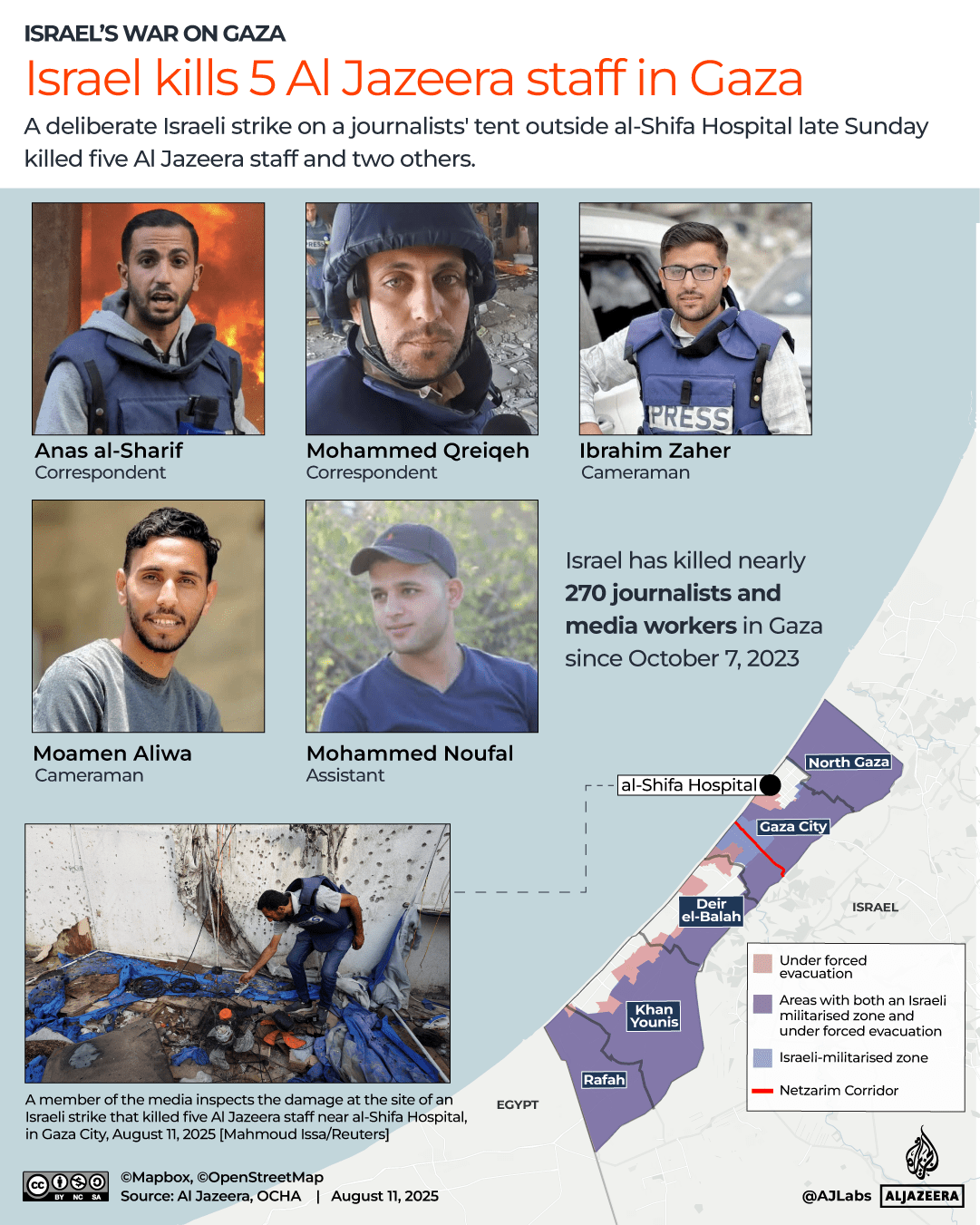
Al Jazeera cameraman Ibrahim Zaher, 25, was from Jabalia refugee camp in northern Gaza.
Al Jazeera cameraman Mohammed Noufal, 29, was also from Jabalia. He lost his mother and one brother in earlier Israeli attacks. His other brother, Ibrahim, also works as a cameraman for Al Jazeera.
They were working.
The team was in a tent by the main gate of Gaza City’s al-Shifa Hospital late on Sunday evening.
The tent was where they worked, as journalists in Gaza have gathered at hospitals to seek better electricity and internet connections, a fact that has been well-known since the start of Israel’s war on Gaza.
“I’m not far from al-Shifa Hospital, just one block away, and I could hear the massive explosion that took place in the past half an hour or so, near al-Shifa Hospital,” Al Jazeera’s Hani Mahmoud reported yesterday.
“I could see it when it lit up the sky and, within moments, the news circulated that it was the journalist camp at the main gate of the al-Shifa Hospital.”
Al Jazeera’s reporter Hani al-Shaer said an Israeli drone hit the journalists’ tent at approximately 11:35pm (20:35 GMT) on Sunday night.
Shortly before being killed, al-Sharif wrote on X that Israel had launched intense, concentrated bombardment – also known as “fire belts” – on the eastern and southern parts of Gaza City.
Journalist Amer al-Sultan was in a neighbouring tent when the attack took place.
“I came to the scene and saw all the destruction,” al-Sultan said, standing amid the tent’s wreckage, his back to a concrete wall pocked and splattered from the attack. “[I thought] all our colleagues were martyred.”
Al-Sultan added that he wasn’t sure who the journalists were who were in the tent, but “when I started filming, I saw our colleagues Anas al-Sharif was on the ground and Mohammed Qreiqeh, who was on fire.
“We started to pull him out and try to put out the fire.”
The people gathered there tried to get Qreiqeh inside al-Shifa Hospital, but he succumbed to his wounds before they could get him treatment, al-Sultan said.
Mohammed Qeita, a freelance journalist, was also nearby.
“I was not just a witness to the event, I was part of it…The fire was very strong.
“Even now, I can’t believe it,” he said.
“We knew Anas was the target… He was our voice.”
It said one of them wasn’t really a journalist.
Israel’s army posted about deliberately killing the journalists, claiming it had wanted to kill al-Sharif, who it accused of being an armed commander for Hamas only posing as a journalist.
In the statement, it accused al-Sharif of “advancing rocket attacks against Israeli civilians and troops” and alleged it had documents providing “unequivocal proof” of this.
Muhammad Shehada, an analyst at the European Council on Foreign Relations, said there was “zero evidence” that al-Sharif took part in any hostilities.
“His entire daily routine was standing in front of a camera from morning to evening,” he told Al Jazeera.
On numerous occasions over the last 22 months, Israel has justified killing reporters by claiming they belonged to armed groups. Groups focused on press freedom and media workers’ rights have said for months that Israel is deliberately targeting journalists in Gaza.
Two of the most prominent incidents included journalist Hamza Dahdouh, son of Al Jazeera’s Gaza Bureau Chief Wael Dahdouh, and journalist Hossam Shabat, who were both assassinated by Israel and accused of being members of Hamas without any evidence.
Al Jazeera called the killing of its staff a “targeted assassination … in yet another blatant and premeditated attack on press freedom”.
It said the journalists “were among the last remaining voices from within Gaza, providing the world with unfiltered, on-the-ground coverage of the devastating realities endured by its people”.
Israel has banned international media from entering Gaza since October 2023, but “Al Jazeera journalists remained within besieged Gaza … [delivering] searing eyewitness accounts of the horrors unleashed over 22 months of relentless bombing and destruction,” the statement said.
Al-Sharif was the face of Al Jazeera Arabic in Gaza and of iconic moments as he reported on Israel’s atrocities in the besieged, bombarded enclave.
For months, Israeli officials had threatened him, demanding that he stop reporting, but he refused, pledging to stay in northern Gaza and continue his coverage.
Numerous rights groups and press freedom groups called for al-Sharif’s protection after he was directly threatened by Israel.
Israel ramped up a smear campaign on al-Sharif in recent months, with army spokesperson Avichay Adraee calling out al-Sharif by name in a video on X last month, accusing him of being part of Hamas’s military wing.
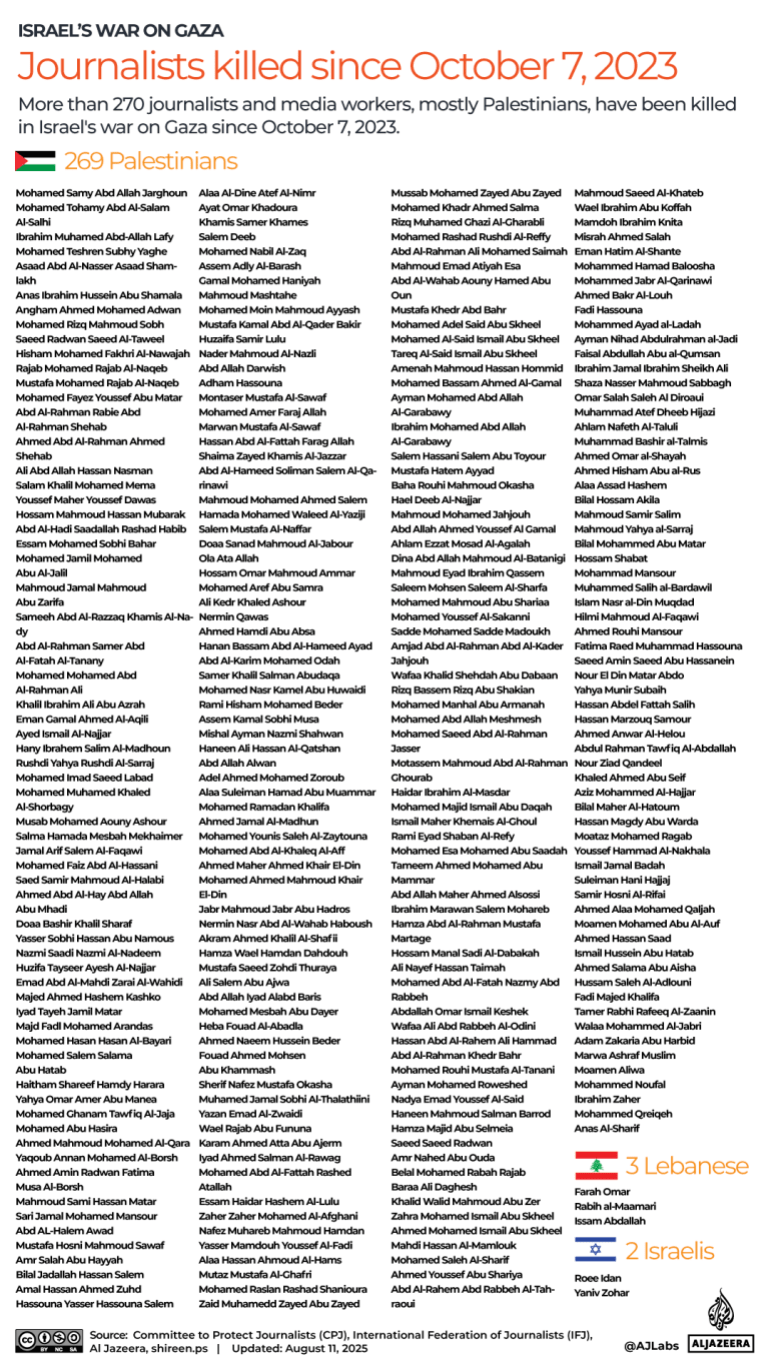
Irene Khan, UN special rapporteur on freedom of expression, said last month that Adraee made “an unsubstantiated claim” and called the smear a “blatant assault on journalists”.
Israel killing al-Sharif was a targeted attempt to shut down coverage of its atrocities, former Executive Director of Human Rights Watch Ken Roth said.
“This is not an accidental killing. This is not a journalist who happened to get caught in Israel’s indiscriminate bombardment of Palestinian civilians in general.
“This was a targeted killing,” Roth told Al Jazeera.
Authorities in Gaza say Israel has killed nearly 270 journalists and media workers since it launched its war on Gaza.
An outpouring of grief and condemnation has followed the Israeli assassination of five Al Jazeera staff in Gaza, including prominent correspondent Anas al-Sharif.
The drone attack late on Sunday hit a tent for journalists positioned outside the main gate of Gaza City’s al-Shifa Hospital, killing seven people. Among the dead were Al Jazeera correspondent Mohammed Qreiqeh and camera operators Ibrahim Zaher, Moamen Aliwa and Mohammed Noufal.
Just hours earlier, al-Sharif, 28, had posted on X about Israel’s “intense, concentrated bombardment” on eastern and southern Gaza City. Known for his fearless reporting from northern Gaza, he had become one of the most recognisable voices documenting the ongoing Israeli genocide in the enclave.
Al Jazeera Media Network has condemned what it called a “targeted assassination” of its journalists.
Below are a few of the responses to the killing of Al Jazeera staff:
The Palestinian mission to the United Nations accused Israel of “deliberately assassinating” al-Sharif and Qreiqeh, describing them as among the “last remaining journalists” in Gaza.
“They have systematically and dutifully exposed and documented Israel’s genocide and starvation,” the mission said on X. “As Israel continues to ethnically cleanse Gaza, its enemy remains the truth: the brave journalists exposing its heinous crimes.”
Iranian Foreign Ministry spokesman Esmail Baghaei has called on the world to hold Israel to account after the killing of the five Al Jazeera staff.
“A press badge is no shield against genocidal war criminals who fear the world witnessing their atrocities,” said Baghaei, accusing Israel of assassinating the journalists “in cold blood”.
“Strong condemnation is the bare minimum for any decent human being, but the world must act immediately to stop this harrowing genocide and hold the criminals accountable,” he added.
“Indifference and inaction are complicity in Israel’s crimes.”
UN Secretary-General Antonio Guterres’s spokesperson, Stephane Dujarric, offered condolences to “the Al Jazeera family” and called for an investigation.
“We have always been very clear in condemning all killings of journalists,” Dujarric said. “In Gaza, and everywhere, media workers should be able to carry out their work freely and without harassment, intimidation or fear of being targeted.”

Al Jazeera Media Network has condemned “in the strongest terms” the killing of its journalists in a targeted assassination by Israeli forces.
In a statement, the network said the Israeli military “admitted to their crimes” and deliberately directed the attack at the journalists’ location. It called the assassination “another blatant and premeditated attack on press freedom”.
The strike came amid what Al Jazeera described as the “catastrophic consequences” of Israel’s ongoing assault on Gaza, including mass civilian deaths, forced starvation, and the destruction of entire communities.
The network called the killing of al-Sharif, one of Gaza’s most prominent reporters, and his colleagues “a desperate attempt to silence the voices exposing the impending seizure and occupation of Gaza”.

The Committee to Protect Journalists (CPJ) says it is “appalled” by Israel’s killing of Al Jazeera journalists.
“Israel’s pattern of labeling journalists as militants without providing credible evidence raises serious questions about its intent and respect for press freedom,” said the CPJ’s regional director, Sara Qudah.
“Those responsible for these killings must be held accountable,” Qudah added.
Jodie Ginsberg, CEO of the CPJ, recalled how Israel accused al-Sharif and others of being “terrorists” last October without evidence.
“We warned back then that this felt to us like a precursor to justify assassination,” she told Al Jazeera. “This is part of a pattern … going back decades, in which it kills journalists.”

Amnesty International condemned the strike as a war crime under international law and remembered al-Sharif as a “brave and extraordinary” reporter.
In 2024, al-Sharif was awarded Amnesty International Australia’s Human Rights Defender Award for his resilience and commitment to press freedom.
“We at Amnesty International are devastated and heartbroken,” said Mohamed Duar, Amnesty International Australia’s spokesperson on the occupied Palestinian territory. “Anas dedicated his life to standing before the camera, exposing Israel’s atrocities against Palestinians, and documenting the truth so the world could bear witness.
“The courageous and brave journalists who have been reporting since the genocide began have been operating in the most dangerous conditions on Earth. At great risk to their lives, they have remained to show the world the war crimes being committed by Israel against almost two million Palestinian women, men and children,” he added.

Mike Balsamo, president of the US-based National Press Club, said the killing of journalists is “a loss felt far beyond one newsroom” and urged a “thorough and transparent” investigation.
“Journalists must be able to work without being targeted or killed,” Balsamo said. “All parties in conflict zones must honour their obligations under international law to protect reporters and ensure they can carry out their work safely.”
The Council on American-Islamic Relations (CAIR) has condemned Israel’s killing of five Al Jazeera journalists and called on US and international media workers to “stand in solidarity” with their Palestinian colleagues.
“Israel’s ongoing campaign of targeted assassinations of Palestinian journalists is a war crime, plain and simple,” CAIR National Executive Director Nihad Awad said in a statement.
“The murder of these Al Jazeera journalists is not an accident or collateral damage – it is part of a consistent, documented policy of silencing media voices and hiding the truth of the genocide being carried out by Israel in Gaza,” Awad said.

Since October 2023, Israel has killed 269 journalists in Gaza, in the deadliest conflict ever recorded for reporters.
If you read the Western press this morning, you may come to believe that Israeli Prime Minister Benjamin Netanyahu’s desire to take military control over Gaza is new. But dropping 2000lb bombs does not rescue captives and wiping out whole neighbourhoods does not come without plans to build something in their place.
On Friday, Israel’s security cabinet approved the occupation of Gaza City, formalising what was always the endgame of this genocide. The plan follows a deliberate sequence: First destroy, then starve, occupy, demand demilitarisation, and finally carry out full ethnic cleansing once Palestinians have no political power and capacity to resist. This is how the dream of “Greater Israel” is achieved.
But why formalise this occupation now, after 22 months of systematic slaughter? Because the crime scene must be sanitised before the world sees what remains of Gaza.
On Sunday, the Israeli army assassinated Al Jazeera journalists Anas al-Sharif, Mohammed Qreiqeh, Ibrahim Zaher, Mohammed Noufal and Moamen Aliwa by dropping a missile on a media tent near al-Shifa Hospital. Their names are now added to the long list of more than 230 Palestinian journalists and media workers that Israel has killed since October 2023.
With Israel banning all foreign media from freely accessing Gaza, Palestinian journalists have been solely responsible for covering and documenting Israeli war crimes. The assassination is a clear message to them to stop, to stay silent.
Meanwhile, foreign journalists who rode on airdrop flights to Gaza were also warned. Aerial footage they released offered glimpses of Gaza’s corpse: A patchwork of shattered concrete, ruins and hollowed streets. It is complete desolation.
The footage shocked viewers across the world and so the Israeli government was quick to ban filming on these flights, warning that aid drops would be halted if there were any violations.
Israel knows it cannot continue to block foreign media access to Gaza forever. The genocide will come to an end eventually; aid convoys and relief workers will be allowed in and with them, foreign journalists with cameras.
So before that day arrives, Israel is racing to erase the evidence because once the world sees Gaza, it will no longer be able to pretend that the war was about anything other than the mass killing of Palestinians and the erasure of their history.
The occupation of Gaza City is the murderer returning to the crime scene to hide the body. The goal is not only to cover up the crimes, but to convince the world that the dead have not died and that what we see is not what it is.
The official death toll in Gaza stands at 60,000, a number that by many expert accounts is an undercount. According to estimates, hundreds of thousands of Palestinians have likely been murdered. As UN experts declared on August 7, “Israel is exterminating the people of Gaza by any and all means.” There are a lot of crimes to cover up.
We have already seen the modus operandi of the Israeli army in trying to destroy evidence in Gaza. It has buried massacred civilians in mass graves with bulldozers; it has withheld bodies of Palestinian torture victims; it has dug into the sand whole crime scenes of execution; it has planted weapons in hospitals that it has ransacked; it has lied about discovering tunnels.
All of this fits neatly with Israel’s long history of burying evidence of atrocities. Since 1948, Israeli authorities have systematically erased their ethnic cleansing of Palestinians by building on top of the ruins of pillaged Palestinian villages and towns.
Israeli intelligence has also removed documents from archives that provide evidence of Zionist and Israeli forces committing war crimes during the Nakba of 1948. Some of the documents that have disappeared give gruesome details about the brutality of Zionist fighters during massacres of Palestinians, like in the village of Dawaymeh, near Hebron, where hundreds of Palestinian men, women, and children were killed by artillery fire or directly executed. In 1955, the settlement of Amatzia was built on the ruins of the Palestinian village.
By occupying the northern part of the Gaza Strip now, Israel will certainly resort to these same methods of erasure and falsification. It will also be able to control foreign media coverage, just as it has done until now.
The Israeli army has only allowed foreign journalists into Gaza embedded with its military units under strict conditions that transform reporters into participants in hasbara. Embedded journalists must submit all materials for military review before publication, must operate under constant observation, and cannot speak freely with Palestinians.
Journalists thus become mouthpieces for the Israeli military, parroting their justifications for wholesale destruction and propagating their lies about Palestinian civilians as “human shields” and Gaza hospitals and schools as “terror hubs”.
The full-scale occupation can also help facilitate further massacres and ethnic cleansing. Those who refuse forced displacement will be labelled “militants” to excuse their slaughter. Israel used this strategy early into the genocide, dropping leaflets warning Palestinians in northern Gaza that they will be deemed “partners in a terrorist organisation” if they do not comply with “evacuation orders”.
Mass displacement is essential to the cover-up because it creates a new narrative that Palestinians are voluntarily migrating rather than being ethnically cleansed. The short-term goal is to force those willing to comply into concentration camps in the south and detach them from their homes and land. Over time, it would become easier to expel Palestinians elsewhere and deny them the right to return. It is the same way Nakba refugees were forced to flee to Gaza and were then denied their internationally recognised right of return.
The response of the international community to Israel’s plan has been just more condemnations. Germany went as far as halting military exports that could be used in Gaza – something that should have been done 22 months ago, when Israel started indiscriminately bombing civilians.
These actions are pathetic. They do not absolve these governments of their complicity in aiding and abetting the crime of genocide; they are just another sign of their moral cowardice.
The international community must take decisive action. It must undertake military intervention, as mandated under international law, to force Israel to immediately end the violence, to allow unrestricted humanitarian aid into Gaza, and to give Palestinians the freedom they are entitled to. International journalists must be granted immediate access to collect whatever evidence remains of Israel’s crimes before it disappears under the cover of “military operations”.
It is time the world starts believing Palestinians. For 22 months, Palestinians have said this is genocide. They have said it while stuck under the rubble, while starving, while carrying their children’s bodies. They said Israel was not defending itself but trying to erase Palestinians. They said occupation and ethnic cleansing are the goal. Israeli politicians themselves have said it.
Without urgent international action, the words “never again” will refer not to the prevention of genocide, but to the existence of Palestinian life in Gaza. The truth so many Palestinians have died to tell must not be buried with their bodies.
The views expressed in this article are the author’s own and do not necessarily reflect Al Jazeera’s editorial stance.
Australia will recognise a Palestinian state in September, Australian Prime Minister Anthony Albanese has announced.
Albanese said on Monday that his government would formally announce the move when the United Nations General Assembly (UNGA) meets in New York.
“A two-state solution is humanity’s best hope to break the cycle of violence in the Middle East and to bring an end to the conflict, suffering and starvation in Gaza,” Albanese said at a news conference in Canberra.
Australia’s announcement comes as Canada, France and the United Kingdom are preparing to formally recognise Palestine at the meeting next month, joining the vast majority of UN member states.
It also comes about a week after hundreds of thousands of Australians marched across the Sydney Harbour Bridge to protest Israel’s war in the Gaza Strip.
Speaking a day after the protest, Australian Minister for Foreign Affairs Penny Wong told the Australian Broadcasting Corporation (ABC) that “there is a risk there will be no Palestine left to recognise.”
“In relation to recognition, I’ve said for over a year now, it’s a matter of when, not if,” Wong added.
The opposition Liberal Party criticised the move, saying it put Australia at odds with the United States, its closest ally, and reversed a bipartisan consensus that there should be no recognition while Hamas remains in control of Gaza.
“Despite his words today, the reality is Anthony Albanese has committed Australia to recognising Palestine while hostages remain in tunnels under Gaza and with Hamas still in control of the population of Gaza. Nothing he has said today changes that fact,” Liberal Party leader Sussan Ley said in a statement.
“Recognising a Palestinian state prior to a return of the hostages and defeat of Hamas, as the Government has today, risks delivering Hamas one of its strategic objectives of the horrific terrorism of October 7.”
The Australian Greens, the fourth-largest party in parliament, welcomed the move to recognise Palestine, but said the announcement did not meet the “overwhelming calls from the Australian public for the government to take material action”.
“Millions of Australians have taken to the streets, including 300,000 last weekend in Sydney alone, calling for sanctions and an end to the arms trade with Israel. The Albanese Government is still ignoring this call,” Senator David Shoebridge, the party’s spokesperson on foreign affairs, said in a statement.
The Australian Palestine Advocacy Network (APAN) also criticised the announcement, describing it as a “political fig leaf, letting Israel’s genocide and apartheid continue unchallenged, and distracting from Australia’s complicity in Israeli war crimes via ongoing weapons and components trade”.
“Palestinian rights are not a gift to be granted by Western states. They are not dependent on negotiation with, or the behaviour or approval of their colonial oppressors,” APAN said in a statement.
According to Albanese, Australia’s decision to recognise Palestinians’ right to their own state will be “predicated on the commitments Australia has received from the Palestinian Authority (PA)”.
These “detailed and significant commitments” include the PA reaffirming it “recognises Israel’s right to exist in peace and security” and committing to “demilitarise and to hold general elections”, Albanese said while announcing the decision.
The PA is a governing body that has overseen parts of the Israeli-occupied West Bank since the mid-90s.
It has not held parliamentary elections since 2006 and has been criticised by some Palestinians for helping Israel to keep tight control over residents in the West Bank.
Albanese said the commitments secured by Australia were “an opportunity to deliver self-determination for the people of Palestine in a way that isolates Hamas, disarms it and drives it out of the region once and for all”.
Hamas has been in power in the Gaza Strip since 2007, when it fought a brief war against forces loyal to PA President Mahmoud Abbas.
Meanwhile, New Zealand’s Foreign Minister Winston Peters said on Monday that his country’s cabinet will make a formal decision on Palestinian statehood in September.
“Some of New Zealand’s close partners have opted to recognise a Palestinian state, and some have not,” Peters said in a statement.
“Ultimately, New Zealand has an independent foreign policy, and on this issue, we intend to weigh up the issue carefully and then act according to New Zealand’s principles, values and national interest.”
Peters said that while New Zealand has for some time considered the recognition of a Palestinian state a “matter of when, not if”, the issue is not “straightforward” or “clear-cut”.
“There are a broad range of strongly held views within our Government, Parliament and indeed New Zealand society over the question of recognition of a Palestinian state,” he said.
“It is only right that this complicated issue be approached calmly, cautiously and judiciously. Over the next month, we look forward to canvassing this broad range of views before taking a proposal to Cabinet.”
Of the UN’s 193 member states, 147 already recognise Palestinian statehood, representing some three-quarters of the world’s countries and the vast majority of its population.
Under its 1947 plan to partition Palestine, the UNGA said it would grant 45 percent of the land to an Arab state, though this never eventuated.
The announcements by Australia and New Zealand on Monday came hours after an Israeli attack killed five Al Jazeera staff members in Gaza City, and as Israeli Prime Minister Benjamin Netanyahu continues to threaten a full-scale invasion of the city in the north of the Gaza Strip.
Israel’s war on Gaza has killed at least 61,430 people, according to Gaza’s health authorities.
Close to 200 people, including 96 children, have died from starvation under Israel’s punishing siege, according to health authorities.
Australian PM Anthony Albanese says Australia will recognise a Palestinian state at next month's UN General Assembly.
Source link
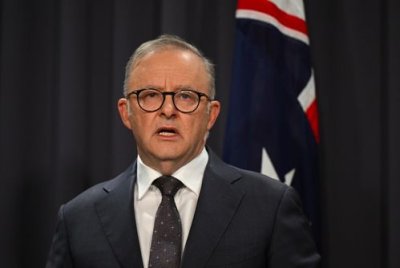
Australian Prime Minister Anthony Albanese on Monday announced that Canberra will recognize a Palestinian state. File Photo by Lukas Coch/EPA-EFE
Aug. 11 (UPI) — Australia will recognize the state of Palestine, Prime Minister Anthony Albanese announced Monday, making Canberra the latest Western government to take the mostly symbolic and political move that is expected to anger not only Israel but the United States.
Albanese, speaking during a press conference in Canberra, said that Australia will formally make the recognition in September, during the 80th session of the United Nations General Assembly.
“Australia will recognize a state of Palestine. Australia will recognize the right of the Palestinian people to a state of their own, predicated on the commitments Australia has received from the Palestinian Authority,” he said.
“We will work with the international community to make this right a reality.”
Australia’s announcement comes just a few short weeks after France, then Britain, followed by Canada, made public their intentions to recognize a Palestinian state in September.
It also comes amid mounting criticism against Israel over its war in Gaza, where famine threatens. That criticism has only increased since late last week, when the Israeli government of Prime Minister Benjamin Netanyahu said it will expand its military offensive in the Palestinian enclave with plans to seize control of the entire Gaza Strip.
Albanese said Australia was making the announcement following a cabinet meeting as part of a “coordinated global effort” behind a two-state solution to the Israel-Palestinian conflict.
Netanyahu was among the world leaders to whom Albanese said he spoke about this decision.
Israel is expected to staunchly reject Australia’s decision, as it did when other nations moved to recognize a Palestinian state.
During a press conference Sunday for foreign journalists, Netanyahu lambasted Australia, European nations and others considering recognizing a Palestinian state.
“Most of the Jewish public is committed against the Palestinian state for the simple reason that they know it won’t bring peace,” he said. “To have European countries and Australia march into that rabbit hole, just like that, fall right into it, and buy this canard is disappointing, and I think it’s actually shameful, but it’s not going to change our position. Again, we will not commit national suicide.”
Netanyahu has staunchly opposed a two-state solution.
Albanese on Monday said it was “humanity’s best hope” to end the war in Gaza.
Australian Jewish organizations have come out against their government.
The Executive Council of Australian Jewry in a statement called it “a betrayal and abandonment” of the Israelis who were taken hostage by Hamas on its surprise Oct. 7, 2023, attack.
The right-leaning Australian Jewish Association said it was “more than a betrayal of a friend” and “a reckless attack on the Jewish people in Australia and abroad.”
“This position puts Australia at odds with our closest ally, the United States, and signals weakness to those who seek our harm,” it said in a statement.
The decades-long conflict between Hamas and Israel exploded on Oct. 7, 2023, when the Iran-backed militia launched a bloody surprise attack on the Middle Eastern country.
In response, Israel has devastated Gaza with a massive military offensive that has killed more than 61,000 Palestinians, mostly civilians. Israel’s military now controls about 75% of the enclave and late last week Netanyahu’s government announced an expanded military offensive to seize control of the remaining 25%.
The plan has attracted widespread international criticism. It also comes as famine threatens to take hold of Gaza, where health officials say more than 200 people, including 100 children, have died of starvation.
Netanyahu is wanted for arrest by the International Criminal Court on war crimes charges of using starvation as a method of warfare.
As the war has dragged on, countries have turned to recognizing a Palestinian State as a form of protest.
In May 2024, Norway, Ireland, and Spain came out in support of a Palestinian State.
The United States, under President Donald Trump, a staunch Netanyahu ally, is expected to rebuke Australia, as it has other countries that moved to recognized a Palestinian state.
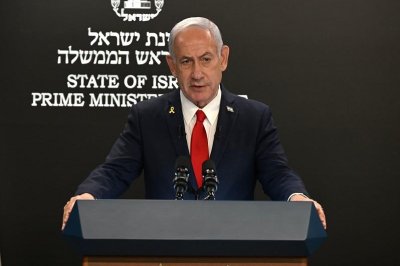
Aug. 10 (UPI) — Israel’s goal in Gaza is not to occupy the devastated Palestinian enclave but to “free it from Hamas terrorists,” Prime Minister Benjamin Netanyahu of Israel said Sunday as he defended the plan to escalate its offensive, which has come under staunch international opposition, including from allies.
“Our goal is not to occupy Gaza, our goal is to free Gaza, free it from Hamas terrorists,” Netanyahu said, speaking in English during a press conference. “The war can end tomorrow if Hamas lays down its arms and releases all the remaining hostages.”
Israel’s security cabinet overnight Thursday approved the plan to take control of Gaza. The Israeli military controls about 75% of the enclave, with Gaza City and the Central Camps and Moasi being the two remaining areas that Netanyahu described as Hamas “strongholds.”
Under the plan, the Israeli military is instructed to “dismantle” them, he said.
“Contrary to false claims, this is the best way to end the war, and the best way to end it speedily,” he said.
Since it was announced, Netanyahu’s plan has been widely condemned for risking not only the roughly 2 million Palestinians who live there but also the Israeli hostages.
Allies Britain, Denmark, France, Greece and Slovenia have called for an urgent meeting of the U.N. Security Council on the situation in Gaza, saying Israel’s decision to expand military operations risks violating international humanitarian law.
“Expanding military operations will only endanger the lives of all civilians in Gaza, including the remaining hostages, and result in further unnecessary suffering,” they said in a joint statement.
Gaza is experiencing a worsening humanitarian situation. According to the Palestinian Ministry of Health, five people have died from starvation in the last 24 hours, including two children, bringing the total to 217 starvation deaths, 100 of them children.
Netanyahu — who is wanted for arrest by the International Criminal Court on war crimes charges of using starvation as a method of warfare — used the press conference Sunday to blame Hamas and the United Nations for the food shortage, saying the militia loots aid trucks and the intergovernmental organization refused to distribute aid brought in on trucks.
“We’ve had tons of uncollected food rotting on the Gazan side of the border because the U.N. was, and still is, unwilling to deliver all of it,” he said.
The United Nations has previously refuted these accusations, stating there are security concerns and bureaucratic roadblocks. Late last month, Stephane Dujarric, spokesman for the U.N. secretary-general, blamed Israel for showing “a lack of willingness to allow us to do our work.”
Netanyahu said there has been a “humanitarian surge” in recent days that is “preventing hunger” while stating that Israel has been the victim of a “global campaign of lies.”
“The only ones that are being deliberately starved in Gaza are our hostages,” he said.
According to U.N. statistics, more than one in three Gazans go days without eating, and nearly a quarter of the Enclave is enduring famine-like conditions.
In the nearly two-year-old war, more than 61,000 Palestinians, mostly civilians, have been killed, according to the health ministry.
Distressing video shows the moment a 15-year-old boy was killed by a falling aid pallet in Gaza. Aid agencies warn airdrops cannot deliver food safely or quickly enough to address starvation in Gaza, which has now killed 100 Palestinian children.
Published On 10 Aug 202510 Aug 2025
Media network condemns ‘assassination’ of its Gaza correspondents and photographers by Israeli forces.
Below is Al Jazeera Media Network’s statement on the killing of Anas al-Sharif, Mohammed Qreiqeh, Ibrahim Zaher and Mohammed Noufal.
Al Jazeera Media Network condemns in the strongest terms the targeted assassination of its correspondents Anas Al Sharif and Mohammed Qraiqea, along with photographers Ibrahim Al Thaher, and Mohamed Nofal, by the Israeli occupation forces in yet another blatant and premeditated attack on press freedom.
In a statement by the Israeli occupation force, admitting to their crimes, the journalists were targeted by a directed assault towards the tent where they were stationed opposite Al-Shifa Medical Complex in Gaza. In which they were martyred. This attack comes amid the catastrophic consequences of the ongoing Israeli assault on Gaza, which has seen the relentless slaughter of civilians, forced starvation, and the obliteration of entire communities. The order to assassinate Anas Al Sharif, one of Gaza’s bravest journalists, and his colleagues, is a desperate attempt to silence the voices exposing the impending seizure and occupation of Gaza.
As Al Jazeera Media Network bids farewell to yet another group of its finest journalists, who boldly and courageously documented the plight of Gaza and its people since the onset of the war, it holds the Israeli occupation forces and government responsible for deliberately targeting and assassinating its journalists. This follows repeated incitement and calls by multiple Israeli officials and spokespersons to target the fearless journalist Anas Al Sharif and his colleagues.
Anas and his colleagues were among the last remaining voices from within Gaza, providing the world with unfiltered, on-the-ground coverage of the devastating realities endured by its people. While international media was barred from entering, Al Jazeera journalists remained within besieged Gaza, experiencing the hunger and suffering they documented through their lenses. Through continuous, courageous live coverage, they have delivered searing eyewitness accounts of the horrors unleashed over 22 months of relentless bombing and destruction.
Despite losing several journalists to deliberate attacks and working under constant threat, Anas Al Sharif, Mohammed Qraiqea, and their colleagues persisted in the strip to ensure the world sees the harrowing truth experienced by Gaza’s populace.
While vehemently condemning these heinous crimes and the ongoing attempts by Israeli authorities to silence the truth, Al Jazeera Media Network calls on the international community and all relevant organisations to take decisive measures to halt this ongoing genocide and end the deliberate targeting of journalists. Al Jazeera emphasises that immunity for perpetrators and the lack of accountability embolden Israel’s actions and encourage further oppression against witnesses to the truth.

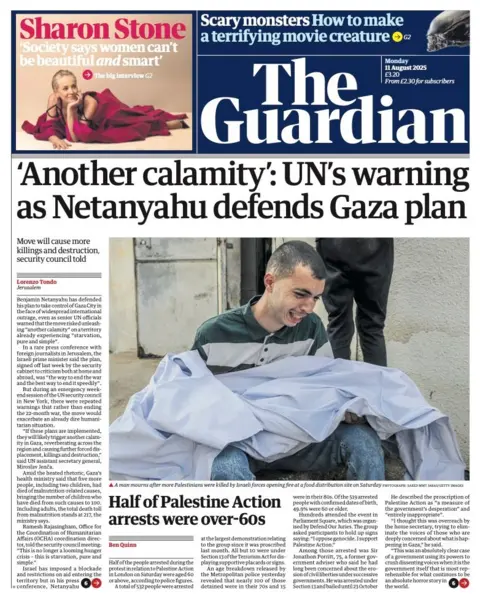

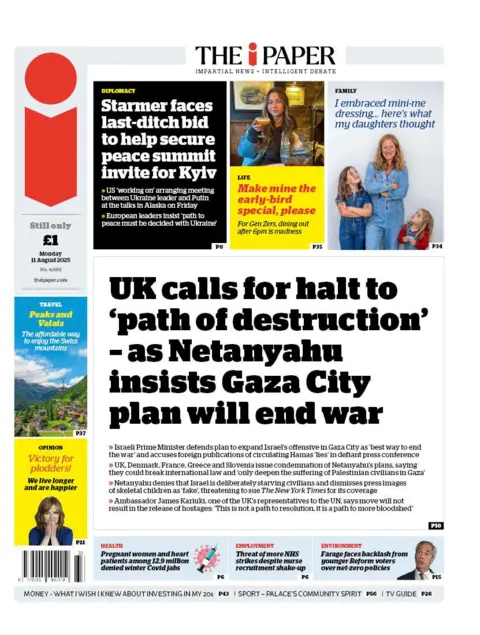

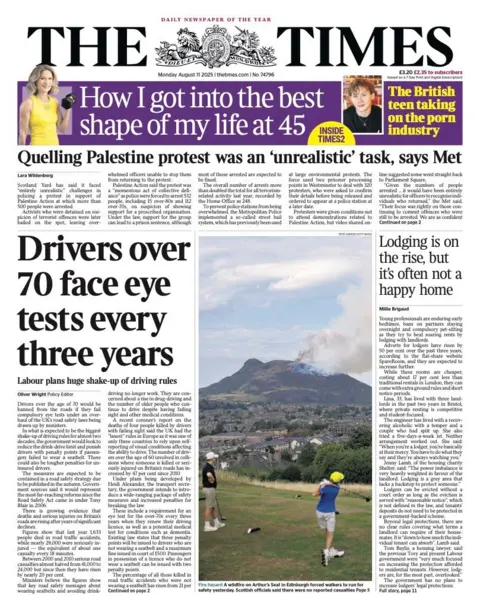

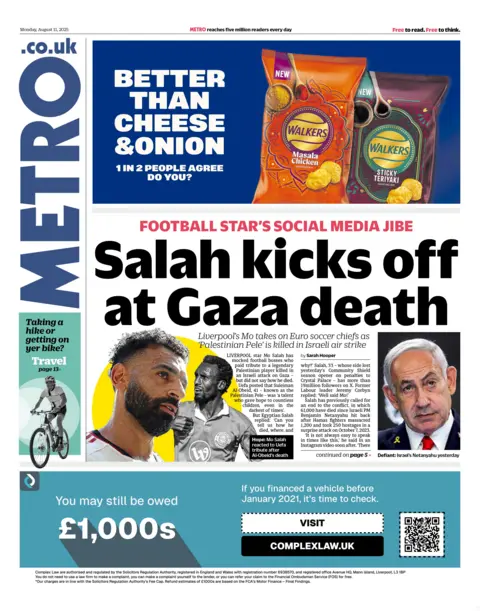



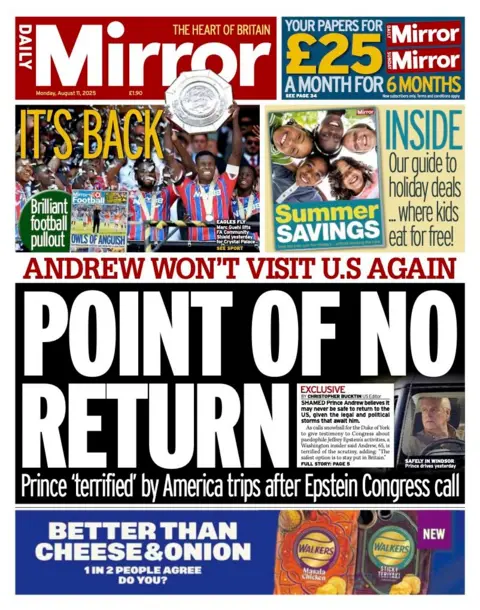



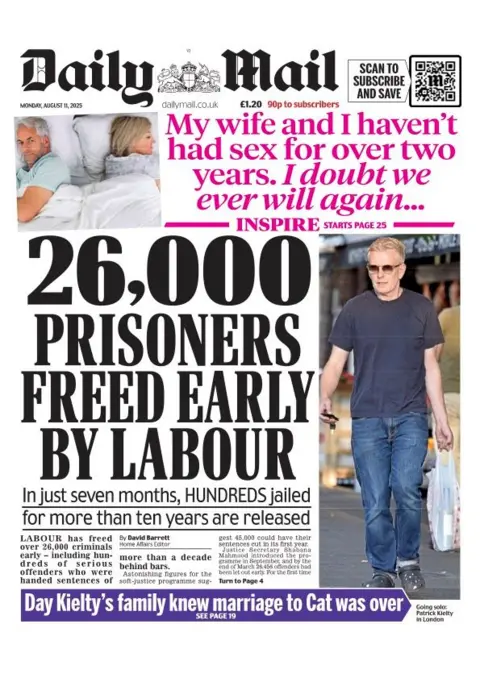










Anas al-Sharif along with four other Al Jazeera journalists have been killed by an Israeli attack.
Source link
Al Jazeera correspondent Hani Mahmoud, speaking over the phone, gives more details on the Israeli attack that killed five of his colleagues, including Anas al-Sharif, in a strike on a journalists’ tent in Gaza City.
Published On 10 Aug 202510 Aug 2025
An Israeli air strike has killed four Al Jazeera journalists including correspondent Anas al-Sharif.
Source link
A senior United Nations official has warned the UN Security Council (UNSC) that Israel’s plan to seize Gaza City risked “another calamity” in the Gaza Strip with far-reaching consequences, as five more people in Gaza reportedly died from starvation – bringing the overall toll to 217, including 100 children.
UN Assistant Secretary-General for Europe, Central Asia and the Americas Miroslav Jenca on Sunday told an emergency weekend meeting that if implemented, the plan could result in the displacement of all civilians from Gaza City by October 7, 2025, affecting some 800,000 people, many of them already previously displaced.
This “will likely trigger another calamity in Gaza, reverberating across the region and causing further forced displacement, killings and destruction, compounding the unbearable suffering of the population,” Jenca said.
Palestinian UN Ambassador Riyad Mansour told the UNSC that Israel was aiming for “the destruction of the Palestinian people through forced transfer and massacres to facilitate its annexation of our land”.
“What will force Israel to change course is our ability to transform justified condemnation into just actions … History will judge us all,” he said.
Foreign powers, including some of Israel’s allies, have slammed Israel’s plan. The United Kingdom, a close ally of Israel which nonetheless pushed for an emergency meeting on the crisis, warned the Israeli plan risked prolonging the conflict.
“It will only deepen the suffering of Palestinian civilians in Gaza. This is not a path to resolution. It is a path to more bloodshed,” the British Deputy Ambassador to the UN James Kariuki said.
Another staunch Israel ally, Germany, said it could not actively support Israel’s plan to expand military operations in Gaza and displace of Palestinians.
“Where are these people supposed to go?” Chancellor Friedrich Merz asked in an interview with public broadcaster ARD. “We can’t do that, we won’t do that, and I will not do that.”
France’s Deputy Permanent UN Representative Jay Dharmadhikari condemned “in the strongest possible terms” the plan, which he said would have “dramatic humanitarian consequences” for civilians already “living in horrifying conditions”.
“The images of children dying of hunger or civilians being targeted as they tried to find food are unbearable,” Dharmadhikari said, urging Israel to comply with international humanitarian law.
The UK, Denmark, France, Greece and Slovenia issued a joint statement asking Israel “to urgently reverse this decision and not to implement” the plan, saying it violates international law.
In a separate statement, the foreign ministers of Spain, Iceland, Ireland, Luxembourg, Malta, Norway, Portugal and Slovenia warned that Israel seizing Gaza City would be “a major obstacle to implementing the two-state solution, the only path towards a comprehensive, just and lasting peace”.
Despite the international backlash and rumours of dissent from Israeli military top brass, Israeli Prime Minister Benjamin Netanyahu has remained defiant over the plan to seize Gaza’s largest urban centre, which was approved by Israel’s security cabinet on Friday.
“The timeline that we set for the action is fairly quickly,” Netanyahu told a news conference in Jerusalem on Sunday. “I don’t want to talk about exact timetables, but we’re talking in terms of a fairly short timetable because we want to bring the war to an end.”
He said Israel had “no choice but to finish the job and complete the defeat of Hamas”, given the group’s refusal to lay down its arms. Hamas said it would not disarm unless an independent Palestinian state was established.
Netanyahu said the military had been given the green light to “dismantle” what he described as two remaining Hamas strongholds: Gaza City in the north and al-Mawasi further to the south.
“This is the best way to end the war and the best way to end it speedily,” he said. “We will do so by first enabling the civilian population to safely leave the combat areas to designated safe zones.”
While the prime minister stressed that these “safe zones” would be given “ample food, water, and medical care”, guards at the controversial Israel- and United States-backed Gaza Humanitarian Foundation (GHF), purportedly established to deliver aid to the starving Palestinian population, have routinely opened fire on the aid seekers, killing dozens at a time.
Asked about the growing criticism targeting his cabinet’s decision, Netanyahu said the country was prepared to fight alone. “We will win the war, with or without the support of others,” he said.
Hamas released a statement responding to Netanyahu’s claim that Israel did not intend to occupy Gaza but “liberate” it from the Palestinian group.
The group said the use of the term “liberation” was an attempt to distort the reality of occupation “that will not cover up the crime of extermination, killing, and systematic destruction for more than 22 months”.
Hamas added that it constituted a “desperate attempt to exonerate” Israel after it killed more than 61,400 Palestinians, including more than 18,000 children.
Israel’s Deputy Ambassador to the UN Jonathan Miller fired back at Hamas at the UNSC session, saying the group was “exploiting” the captives and Gaza’s population to “maintain its position, benefiting from attempts to pressure Israel and from the willingness of some countries to recognise a Palestinian state”.
The United States, a veto-wielding permanent member of the UNSC, has so far shielded its staunch ally from any practical measures of UN censure. Netanyahu’s office said the prime minister spoke with US President Donald Trump about its plan, without elaborating on the outcome of the conversation.
Speaking to Fox News, the US vice president said Washington neither endorsed nor rejected Israel’s decision to seize Gaza City and the entire Gaza Strip at large. “Obviously, there are a lot of downsides and upsides”, JD Vance said.
Netanyahu’s plan also received domestic criticism, with opposition leader Yair Lapid saying its implementation would mean that “the hostages will die, soldiers will die, the economy will collapse and our international standing will crash.”
Israel’s Channel 12 reported it will cost billions of dollars within several months, increasing the country’s deficit by 2 percent and leading to widespread budget cuts in areas such as healthcare, education, and welfare.
The director of the coordination division at the UN Office for the Coordination of Humanitarian Affairs (OCHA) said that the “unacceptable catastrophe” unfolding in Gaza must be brought to an end as he addressed the UN Security Council via videolink on Sunday.
Ramesh Rajasingham expressed concern over “the prolonged conflict, the reports of atrocities and further human toll that is likely to unfold following the government of Israel’s decision to expand military operations in Gaza”.
Israel has blocked all but a trickle of aid from entering Gaza for months and has prevented UN workers from accessing and distributing lifesaving assistance. “The UN has a plan and the systems in place to respond. We’ve said this before, and we will say it again and again: Let us work,” Rajasingham said.
The Government Media Office in Gaza said only 1,210 aid trucks have entered Gaza over the past 14 days. Officials said this represents just 14 percent of the territory’s minimum actual needs of 8,400 trucks.
Netanyahu acknowledged there have been issues of “deprivation” in Gaza, but denied that Israel has a “starvation policy”. Human Rights Watch, among other international organisations, has repeatedly called Israel’s use of starvation of civilians as a weapon of war a “war crime”.
Ahmad Alhendawi, Save the Children International’s director for the Middle East, North Africa and Eastern Europe, told Al Jazeera that his team on the ground was seeing an “exponential increase” in the number of malnutrition cases, with effects that can “span generations”.
“This is not one event. This is not the absence of two or three meals. This is an accumulation of months [of deprivation],” he said. “We can help alleviate the suffering of children in Gaza, but we cannot do that if the government of Israel continues to impose all its limitations.”
BREAKINGBREAKING,
Al-Sharif killed in what appears to be a targeted Israeli attack on a tent housing journalists outside al-Shifa hospital.
Al Jazeera journalist Anas al-Sharif has been killed in what appears to be a targeted Israeli attack, the director of the al-Shifa hospital in Gaza City has said.
Al-Sharif, 28, was killed after a tent for journalists outside the main gate of the hospital was hit.
The well-known Al Jazeera Arabic correspondent reportedly extensively from northern Gaza.
The Al Jazeera Media Network had recently denounced the Israeli military for what it called a “campaign of incitement” against its reporters in the Gaza Strip, including most notably al-Sharif.
In July, Israeli army spokesperson Avichai Adraee reshared a video on social media accusing al-Sharif of being a member of Hamas’s military wing – a claim that has been forcefully rejected as false.
Israel has routinely accused Palestinian journalists in Gaza of being members of Hamas since it launched its war on the enclave in October 2023 as part of what rights groups say is an effort to discredit their reporting on Israeli abuses.
The Israeli military has killed more than 200 reporters and media workers since its bombardment began, including several Al Jazeera journalists and their relatives.
More to follow.
Former UN Senior Humanitarian and Reconstruction Coordinator for Gaza Sigrid Kaag speaks to Talk to Al Jazeera about delivering aid under Israeli siege, amid what many world leaders call genocide. She discusses blocked aid, famine, the collapse of humanitarian norms, and the UN’s credibility crisis. Kaag, also a former deputy prime minister, finance minister, and foreign minister of the Netherlands, offers her perspective on what future remains for a rules-based order when even humanitarian principles are no longer guaranteed.
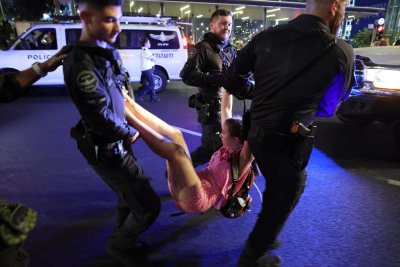
Israeli Police detain a protester who participated with families of Israeli hostages held by Hamas in Gaza. The protest, which called on the government to sign a hostages release and cease-fire deal, was held outside the Kirya military headquarters in Tel Aviv on Saturday. Photo by Abit Sultan/EPA
Aug. 10 (UPI) — Tens of thousands of demonstrators rallied across Israel over the weekend to protest the government’s planned expansion of the war in Gaza as the Israeli Defense Forces itself remained split on the issue.
Israeli Prime Minister Benjamin Netanyahu‘s office announced Friday that the Security Cabinet had approved his proposal “for defeating Hamas,” which included the IDF taking control of Gaza City, where a million Palestinians still live.
The Security Cabinet adopted five principles that it said would end the war, including the disarming of Hamas, the return of all Israeli captives, the demilitarization of Gaza, Israeli security control over the enclave and the establishment of a new civil administration.
Hamas, in a statement, condemned the Israeli decision as a “new war crime” that it said amounted to “ethnic cleansing.”
“We warn the criminal occupation that this criminal adventure will cost it dearly. It will not be a walk in the park. Our people and their resistance are resilient to defeat or surrender, and Netanyahu’s plans, ambitions, and delusions will fail miserably,” Hamas said.
Hamas said that the plan could endanger the lives of the remaining living captives, and added that Israel is “disregarding the lives of prisoners,” a point echoed over the weekend by Israelis demonstrating in Tel Aviv and Jerusalem.
Bring Them Home Now, an organization representing the families of Israelis still held captive in Gaza, shared a photo on social media of a demonstration Saturday of some 60,000 people gathered in Hostages Square across from the Tel Aviv Museum of Art. It also shared footage of the large crowds marching around the Kirya military base.
“Expanding the fighting endangers the hostages and the soldiers — the people of Israel are not willing to risk them!” the group captioned the post. The organization has called for a comprehensive deal to end the war and return the captives home.
Protesters at the demonstration have reportedly included former IDF soldiers who have since refused to serve as the war continues. Former combat soldier Max Kresch told the BBC that some 350 soldiers who participated in the war were refusing service because the war “endangers the hostages and starving innocent Palestinians in Gaza.”
Families of the captives in Gaza and soldiers who have died in the fighting are now calling for a nationwide strike that would shut down the country’s economy on Sunday, the Israeli newspaper Haaretz reported.
The strike has received the support of Yair Golan, the leader of Israel’s Democrats party, who said Sunday on social media that his party would be participating in the strike.
“I call on all Israeli citizens, everyone who holds the value of life and mutual responsibility dear, to strike with us and take to the streets, to fight and disrupt,” he said. “We cannot continue with routine life in the face of abandoning our brothers and sisters in Gaza. We cannot remain silent in the face of this reality.”
Yair Lapid, the leader of the centrist Yesh Atid party, the major opposition party in Israel, called the strike “justified” in a statement Sunday.
“The call of the hostages’ families to shut down the economy is justified and worthy; we will continue to stand by their side,” he said.
Before the Security Cabinet approved the plan to seize control of Gaza City on Friday, IDF chief Lt. Gen. Eyal Zamir reportedly said it was “vital” for Israelis to dissent against the plan, which he warned would “drag Israel into a black hole.” Zamir reportedly said that the operation would take years and expose to Israeli soldiers to guerilla warfare.